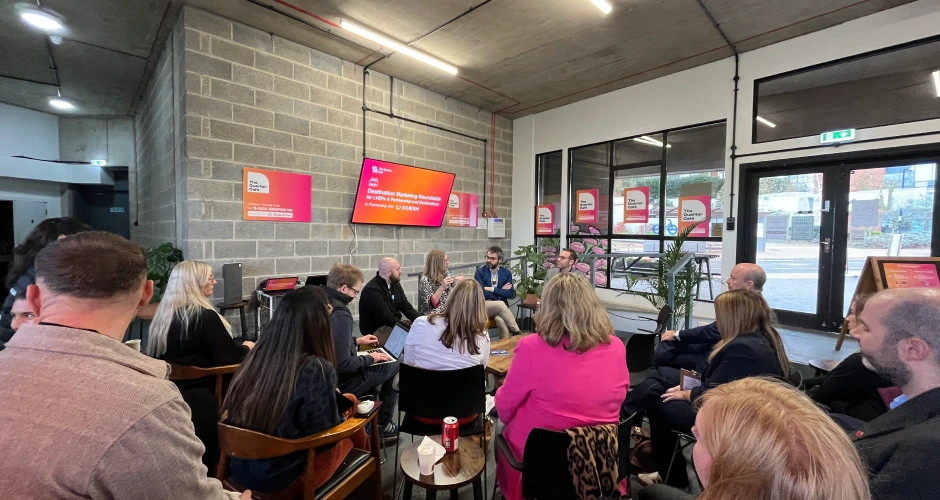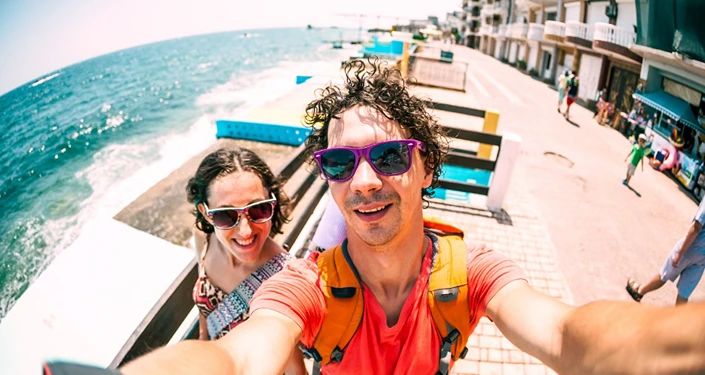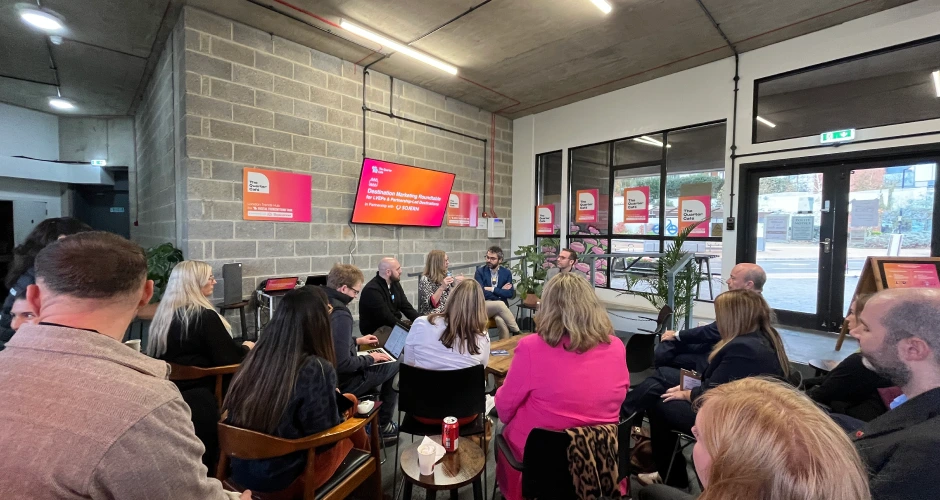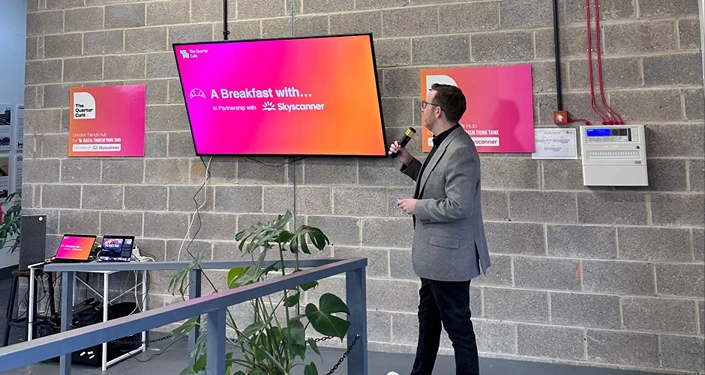In our Backstage Leadership Conversations podcast series, in collaboration with Abu Dhabi's Culture and Tourism Department, we explore the post-pandemic trends in business travel, focusing on key areas such as technology, impact, sustainability and recovery. Learn how Abu Dhabi is helping the MICE sector to thrive.
For this series, we went backstage at Abu Dhabi Business Events Week and had engaging discussions with a range of interesting leaders from across the sector to understand more about the shifts and trends they have witnessed in their work. We heard a range of different perspectives and talked about how everybody can collectively come together to reinforce Abu Dhabi's very competitive positioning and continue to help the MICE sector thrive as a more competitive, exciting and innovative industry as we come out of the pandemic.
Nick Hall
In the seventh episode, we dive into where technology disruption might come from next with Allister Frost, the future-ready mindset expert. Allister is a digital transformation pioneer, who has been developing his understanding of how we can develop a future-ready mindset throughout the last three decades, which have spanned a really fascinating career. From his early days as a Marketing Manager at Kimberly Clark, to his appointment as Microsoft's first Head of Digital Marketing Strategy, he's been paying close attention to the magical point where people and technology intersect. This has given him unique insights into the challenges our technology-fuelled future will create, but also into the opportunities that they can bring.
During his keynote at the Abu Dhabi Business Events Week, Allister mentioned something that stuck with me. Change can sometimes take a different form. It doesn't always have to be big and radical. It can also be small, iterative processes that can create a lot of impact. Knowing that Allister has spent the last 10 years of his career working with a vast array of brands across all sectors, to advise them on the importance of adaptability, I wanted to get his opinion on what this means for the tourism industry in today's context.
Allister Frost
I was very privileged when I was at Microsoft as I got myself a front-row seat in the world of technology. It was a big culture shock for me because I came from a very traditional established organisation, manufacturing fast-moving consumer goods. It was incredibly inspiring for me to realise how much I had to change as an individual to cope with the pace of technological change.
What has happened since is obviously that technology keeps moving forwards and it accelerates. Technology breeds more technology, which we've known for many years. What I've been doing is trying to help other organisations who are not as directly related to the world of technology as a company like Microsoft, to help them to come to terms with that and realise that they too need to go through the sorts of changes that I went through myself when I arrived at Microsoft.
Adaptability for me is just a recognition that you cannot continue to do business as normal. You have to radically change parts of your culture, thinking and leadership to allow you to seize opportunities more quickly and to innovate and experiment. This is just as relevant to the travel industry as it is to every other industry.
Nick Hall
Taking into consideration that we often mistakenly consider adaptability as something that's linked to technology and requires very specific expertise, I asked Allister what his thoughts are on this. His background clearly shows us that we should defy many of the misconceptions that exist when we think about technology and how we apply and embrace the opportunities that it can bring within our industry.
Allister Frost
I think we get seduced by technology. I often talk about Shiny Object Syndrome and we all get it. We see some new thing come out - such as a new smartphone or 3D goggles - and you think it's really cool and fall in love with it. It's never about the technology for me, it's about the place where technology and people collide. When they come together, does it actually work to solve a problem that people genuinely have? Far too often with technology solutions, we see something and think we need to have that because it will prove we're progressive. But actually, does it solve a problem? Is it useful? Will the people for whom we design it, actually accept it and want to have that in their lives.
For me, every organisation I work with suffers from this problem of falling in love with technology rather than pursuing what is right for their customers. At the end of the day, I'm a marketing guy. Everybody in the travel industry should consider themselves to be a marketing person. At the end of the day, it is about the end consumer of the product. If you're thinking about them, that is generally a better way to guide your decision making for adaptation and being future-ready than by seizing whatever technology catches the corner of your eye.
Nick Hall
The phrase that Allister mentioned - Shiny Object Syndrome - really stuck with me as it's something that I believe we should all reflect on a little bit more as we look towards new opportunities that lie ahead. We must also remember to be human-centric when designing new developments and thinking of how they could be integrated with existing products.
I wanted to explore with Allister the importance of embracing new developments, such as the Metaverse and AR, reflecting how they are proving to be disruptive in today's environment. In this regard, we consider the way they are changing business models and how we adapt to these new technologies on a day-to-day basis.
Allister Frost
It's important that we're aware of them and we think about them. However, ultimately, unless they actually solve a customer problem, then they're possibly not the right thing to do. I'll go back to my previous answer, which is we start with the customer. We actually work out if this is going solve a relevant problem and we only adopt those things as and when they serve that purpose.
The thing with technology is there will always be something new and it will always be bigger and better. The uncertainty we have is that whatever you do today will be horrifyingly out of fashion in a few years' time, but we don't know when. Whether it's the Metaverse, AI or augmented reality, we know that's only going to be for a short period of time. Nevertheless, it might be a crucial stepping stone on the pathway to whatever follows. You need people in your organisation who are aware of and thinking about the possibilities, carefully evaluating them for what your organisation is trying to do and making informed decisions about whether this is where we should place a bet or not.
What tends to happen is the opposite, Shiny Object Syndrome creeps in. We go to a conference, exhibition or event, or a supplier finds us and tell us about this amazing thing they can do. Before we know it, we've got an app that nobody wanted or we've got a virtual reality display that doesn't actually add anything to the customer experience. That is the lens through which you've got to look at technology.
Nick Hall
I think we all know about this we need an app syndrome and we need to remind ourselves that perhaps today it's no longer about apps. We need to keep asking ourselves, are we suffering from that? Are we following the technology, but not the problem?
Allister Frost
Apps are just one example. That is probably an outdated reference now because most organisations have tried an app and they've either succeeded or failed. The reason we got apps is because we saw apps all around us. We contacted suppliers and they have a developer in a corner twiddling their fingers with nothing to do. They will sell that developer to us for however long we want and we will have an app. What we haven't done is asked what is the future of apps. Where is this going? How do we maintain the app? What's the cost of the app? There are a lot of factors to consider. One of my personal bugbears is whether we have the app on iOS, the Apple operating system, or do we do it for Android?
All of these very intelligent questions that you should ask, we tend not to ask because we think we're in the hands of the experts. Sometimes the experts have got an app to sell so they'll lead you down that path. That's why you have to think for yourself. You've got to have enough awareness to make an intelligent judgment on those options that will come forward, and there will always be more. There will always be something else. So, it's better to build that muscle internally so that you can properly evaluate these things.
Nick Hall
Organisations need to have the ability and agility to analyse the environment, enabling an assessment of the viability of different trends and what they might mean for both the business and their customers. In many organisations, this seems to be a challenge due to their structures, which make things like prototyping and iterative testing really complicated.
I wanted to see what Allister's view was on this and what recommendations he has for those organisations that require more agility to be built into their structures and their teams as well as how we might think about some of the opportunities as we look forward.
Allister Frost
What I preach is that the responsibility lies with every individual in the organisation. It's the culture of the organisation that will determine whether people will take it on. Individuals are more than capable of having brilliant ideas and seeing possibilities from all parts of the organisation. It might be someone who works behind the reception desk who's answering the telephone. It might be someone in the staff canteen. It doesn't actually matter where they work in the organisation and what their speciality is. They are all capable of viewing possibilities and having ideas. What I preach is this concept of a future-ready mindset across the organisation where all individuals in that company are empowered to think about the future and to bring ideas to the table.
The problem that I see more often than not is that we create an innovation department. These are the research and development people, who are thought of as being the ideas team. It gives the rest of the organisation permission not to have ideas. Why would you want to do that? Why are those three or four people better at having ideas than anybody else? They aren't of course.
What's much better is if you've got a whole company that's saying we are thinking about the future. We do want to serve our customers in the long-term and to consider how we do that through empowering everybody to have ideas, from the top leadership down to the new recruit.
Nick Hall
So it's about complete culture change within the organisation, rather than insourcing that to one department where everybody else gets off scot-free. That's a mindset shift.
Allister Frost
It doesn't have to be that, you can still do it in small pockets. Typically, departments such as marketing and communications may be more forward-thinking because that's their role. They have to be at the leading edge if they want to be successful. So you can start with small teams and small groups. However, the ultimate situation that I like to see is that the leaders of the company want everybody to be thinking not just about today, but also about the future.
I've got this very simple distinction in my mind of the brilliant people in the companies that I meet. There are people who are today-ready and they get up in the morning and they hit the ground running and they do everything. They hit their deadlines, they do their emails, they turn up to meetings on time. Brilliant people, you need them. Nevertheless, there are also people who are future-ready, who do all the today-ready stuff as well as exploration and ideation. They are exploring and thinking beyond today. They are thinking about what is next. They are prepared to hypothesise about possibilities, to experiment, test and learn. The more of this that you can build into your organisation, the richer your growth path will be.
Nick Hall
Looking back at Allister's visit to Abu Dhabi, I wanted to get his perspective on the travel industry's ability to adapt and embrace change and how this looks compared to other industries that Allister worked with and provided really sound advice to.
Allister Frost
I think the travel industry is a little hard on itself. It has innovated more than it perhaps realises. It's just that the innovations are kind of slow and creeping and not radical reinvention. It's not like suddenly we're using time travel or something dramatic, it's just kind of a slow-creeping thing.
I think actually a lot of the travel industry has gone through radical change, maybe not in the last couple of years because of all of the disruption that's happened. However, the industry has been transferring the ways that customers can buy products, research products and access them as well as making them easy to consume and changing the experience while you're in the destination or even in the air. I think they've done a huge amount. Actually, it's far from the worst industry for change.
What it can do more of is being more progressive and thinking faster. I passionately believe that it's a hugely competitive sector. If you want to be the best, if you want to be the destination or provider of choice, you've got to have an organisation that thinks and learns faster than your competitors. It's not about driving down the price or having more stars on the badge above the hotel. It's actually about thinking and acting faster so that you are learning. I think the travel industry has been a good proponent of that in many areas, but like everyone, can probably do more. It's the people that seize that opportunity and realise that ambition.
Nick Hall
To wrap up my insightful conversation with Allister, highlighting the outcomes of the Abu Dhabi Business Events Week was really important as the event served to bring together different perspectives from across the sector to collaborate and allow for ideas to be fostered and harnessed, pushing the evolution of the industry ever forwards. With this in mind, I was curious to hear what his opinion was on the event, and what he thought about Abu Dhabi as a destination.
Allister Frost
It's been phenomenal. The audience and the people that were collected, and the conversations that I had were fascinating. It's a reminder that when you get people together and put them into a nice environment like Abu Dhabi, where they're catered well for and looked after, they feel comfortable and relaxed, and the conversations that flow from this are extraordinary.
I think it is a remarkable demonstration of what the travel industry does, at its very best. I've thoroughly enjoyed my trip here, met some amazing people and had some really mind-blowing conversations. I hope that others are going away with a freshness of spirit just as I am and thinking actually there's even more opportunity than I realised. This was always there, it just needed that physicality of getting people together and making that magic happen and fair play to Abu Dhabi for making this happen. It was remarkable.
Nick Hall
From my conversation with Allister, I was able to get a better understanding of the importance of organisations being agile to adapt to disruption, whether it comes from technology or other factors in the operational environment that tends to be out of our control.
We also had some really key takeaways, such as the fact that when it comes to technological developments, expertise is not everything. We also have the ability to consider how these might fit in with our product and our customers. We should evaluate and consider the relevance it might have for everything we're doing; from internal through to how it impacts our overall experience within the destination.
Key Takeaways
The tech industry is constantly evolving, and organisations that are not tech-centred need to be adaptable in order to survive. This means being open to change and willing to adapt their thinking, leadership, and culture.
The travel industry has changed more than it is often credited for, but there is still a large opportunity to be more progressive. Organisations in the travel industry need to focus on innovation that is customer-centric and that makes travel more sustainable.
Here are some additional takeaways:
- Adaptability is essential for the tourism industry in order to stay ahead of the curve and meet the needs of changing customers.
- Technology can be a powerful tool for innovation, but it is important to focus on solutions that solve real problems.
- Shiny Object Syndrome can lead to wasted resources and missed opportunities.
- A future-ready mindset is essential for organisations that want to succeed in the long term.
- Everyone in an organisation should be encouraged to think about the future and bring ideas to the table.
The future of the tourism industry is bright, but only if it can adapt to the changing needs of its customers and the ever-changing technological landscape.






.svg)





.webp)










.webp)
